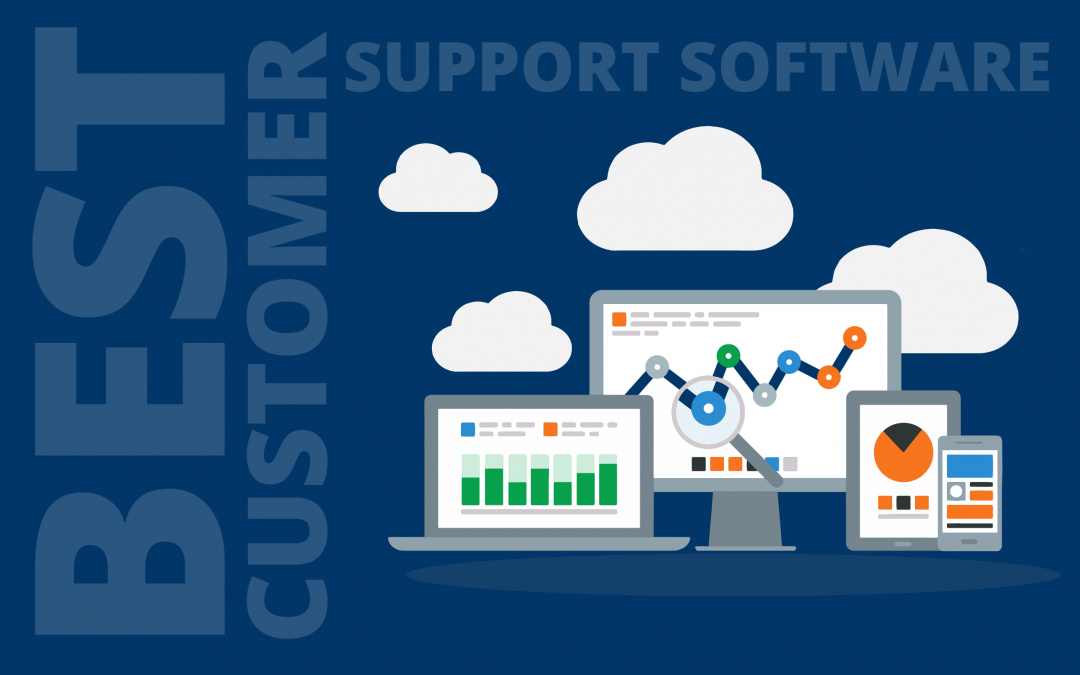Research shows that 86% of buyers are willing to pay more for a great customer experience, and companies that prioritize customer support software see up to 60% higher profits. With the rapid digital transformation, businesses must adopt the best customer support software to enhance efficiency and satisfaction.
This software helps automate tasks, centralize data, and optimize communication, allowing businesses to resolve issues faster, personalize customer interactions, and reduce costs. From small startups to large enterprises, leveraging the right technology can create a competitive edge in customer service.
In this article, we explore how customer support software enhances business efficiency and customer satisfaction, the features that matter, and how to choose the best customer support software for your business.
Understanding Customer Support Software
Customer support software is a digital solution that helps businesses manage customer inquiries, automate support processes, and improve communication. It includes help desk software, live chat support, ticketing system, and AI chatbots. By consolidating customer interactions in one place, it enables support teams to respond faster and more efficiently.
Real-Life Example:
Zappos, an online retailer, uses customer support software to provide 24/7 personalized assistance. With a centralized ticketing system and AI-powered chatbots, they have reduced response time by 40% while maintaining high customer satisfaction.
What is Customer Support Software?
Customer support software is a platform that helps businesses handle customer inquiries, complaints, and support tickets through various channels like email, chat, and phone. It improves response times, workflow automation, and service quality, ultimately boosting customer loyalty and brand reputation.
Key Features and Functionalities:
- Ticketing System: Tracks and organizes customer queries.
- Automation & AI: Reduces manual workload and speeds up responses.
- Multi-Channel Support: Integrates email, chat, and social media.
- Analytics & Reporting: Provides insights into customer interactions.
- Self-Service Portals: Allows customers to find answers independently.
The Role of Customer Support in Modern Businesses
Research shows that 96% of customers say customer service impacts their loyalty to a brand. Today, businesses rely on customer support software to provide faster, more personalized assistance. AI-powered chatbots, automation, and live chat support are now essential tools for enhancing customer experience.
Key Benefits:
- Faster Response Times – Studies show that businesses using automation reduce response times by 50%, improving customer satisfaction.
- Cost Reduction – AI chatbots save companies up to 30% in support costs, according to Gartner.
- Personalized Support – Data-driven insights help businesses tailor customer interactions for better engagement.
- Customer Retention – A Harvard Business Review study found that companies with excellent support increase retention rates by 5%, leading to higher profits.
- Competitive Advantage – Businesses using AI-driven support systems are 20% more efficient than those relying on manual processes.
The Evolution of Customer Support Software
Customer support has evolved from manual phone-based support to AI-driven automated systems. Today, omnichannel support, machine learning, and predictive analytics are transforming customer service.
Key Evolution Milestones:
- Phone-Based Support (1900s-1990s) – Studies show that before automation, businesses struggled with high wait times and inefficiency.
- Email & Ticketing Systems (2000s) – Research by McKinsey found that businesses using email-based support saw a 20% improvement in response time.
- Live Chat & AI Chatbots (2010s) – According to Forbes, AI chatbots now handle 80% of routine customer inquiries.
- Omnichannel Support (2020s) – Businesses using an omnichannel approach experience a 91% higher customer retention rate.
- Predictive AI & Automation (Future) – AI-driven predictive support is expected to reduce customer complaints by 30% in the next decade.
Enhancing Business Efficiency with Customer Support Software
Customer relationship software automates processes, reduces response time, and centralizes customer data, leading to higher operational efficiency. Businesses using automation see a 25% boost in productivity.
Key Benefits:
- Automating Repetitive Tasks – AI-powered automation handles FAQs, reducing manual workload by 40%.
- Reducing Response Time – Faster ticketing system resolution improves customer satisfaction by 35%.
- Centralized Data Management – A unified system improves customer insights and service consistency.
- Streamlining Communication – Omnichannel help desk software enhances the customer journey across multiple platforms.
- CRM & Business Tool Integrations – Seamless integration with CRM systems ensures efficient data handling and personalization.
Improving Customer Satisfaction with Support Software
Studies reveal that 73% of consumers prefer businesses that offer instant, AI-powered responses. Customer support software ensures seamless service delivery, enhancing satisfaction.
Key Benefits:
- Personalized Customer Experience – AI-driven insights improve personalization, increasing satisfaction by 40%.
- Faster Query Resolution – Businesses using issue tracking software resolve issues 60% faster, as per IBM research.
- Self-Service Portals – 67% of customers prefer self-service, reducing ticket volume by 25%.
- AI Chatbots – Studies show AI chatbots cut support costs by 30% while handling routine queries.
Types of Customer Support Software
Businesses use different types of support software to streamline operations and improve service quality.
Popular Solutions:
- Help Desk Software – Tracks and manages support tickets (e.g., Zendesk).
- Live Chat Software – Offers real-time support (e.g., Intercom).
- Ticketing Systems – Organizes customer inquiries efficiently (e.g., Freshdesk).
- AI-Powered Support – Provides automated assistance (e.g., Wowdesk).
Explore Wowdesk’s customer support software today at no cost!
Choosing the Right Customer Support Software for Your Business
1. Scalability
As businesses grow, customer support software demands increase. The best customer service Software,software should scale effortlessly to accommodate higher ticket volumes, additional users, and new support channels. A scalable solution ensures seamless expansion without performance issues or requiring frequent upgrades.
2. Integration Capabilities
The software must integrate with CRM, email, and business tools to ensure smooth workflow automation and centralized customer data. Poor integration can lead to data silos and inefficiencies. Choosing a solution with robust API support improves efficiency and enhances customer interactions.
3. Cost & ROI
Investing in the best customer support software ensures long-term cost savings and increased efficiency. Businesses should analyze pricing plans, licensing fees, and potential ROI before committing. Avoiding unnecessary features and opting for cloud-based solutions can optimize costs while maintaining high performance.
4. Industry-Specific Needs
Different industries have unique customer service requirements. Retail may need omnichannel live chat support, healthcare requires HIPAA compliance, and finance demands strict security protocols. Choosing industry-specific software ensures tailored features, compliance, and operational efficiency for better customer experience.
5. Ease of Use
A user-friendly interface ensures quick adoption, reducing the need for extensive training. Complicated systems can frustrate employees and slow down response times. Choosing an intuitive, easy-to-navigate platform with a simple dashboard and automation tools improves efficiency and employee productivity.
Challenges and Considerations in Implementation
1. Employee Resistance
Employees may resist new software due to unfamiliarity or fear of job displacement. Implementing structured training programs, offering hands-on practice, and highlighting efficiency benefits can encourage adoption. Providing continuous support and incentives ensures a smoother transition and minimizes disruptions.
2. Integration Issues
Customer support software must integrate seamlessly with CRM, email, and communication tools to ensure smooth data flow. Poor integration leads to inefficiencies, manual work, and disjointed customer experiences. Businesses should choose software with strong API support and test integrations before full deployment.
3. Cost Management
Hidden costs such as licensing, upgrades, and maintenance can exceed budgets if not managed properly. Businesses should compare pricing plans, assess long-term ROI, and avoid overpaying for unnecessary features. Cloud-based or scalable solutions help optimize spending without compromising functionality.
4. Customization Needs
Off-the-shelf software may not align with industry-specific requirements. Lack of customization can result in inefficient workflows and limited scalability. Businesses should select solutions that offer workflow automation, AI-driven customization, and industry-specific features to enhance customer experience and operational efficiency.
5. Data Security
Handling sensitive customer data requires compliance with privacy regulations like GDPR, CCPA, and HIPAA. Businesses must implement end-to-end encryption, role-based access, and regular security audits to prevent data breaches, cyberattacks, and regulatory penalties, ensuring customer trust and legal compliance.
Conclusion
Investing in customer support software boosts efficiency, automates workflows, and enhances customer satisfaction. Businesses that prioritize customer experience see higher retention rates and revenue growth. As AI and automation continue to evolve, companies leveraging advanced help desk software, ticketing systems, and live chat support solutions will stay ahead in the competitive market. Now is the time to enhance customer support software with AI-driven solutions!




